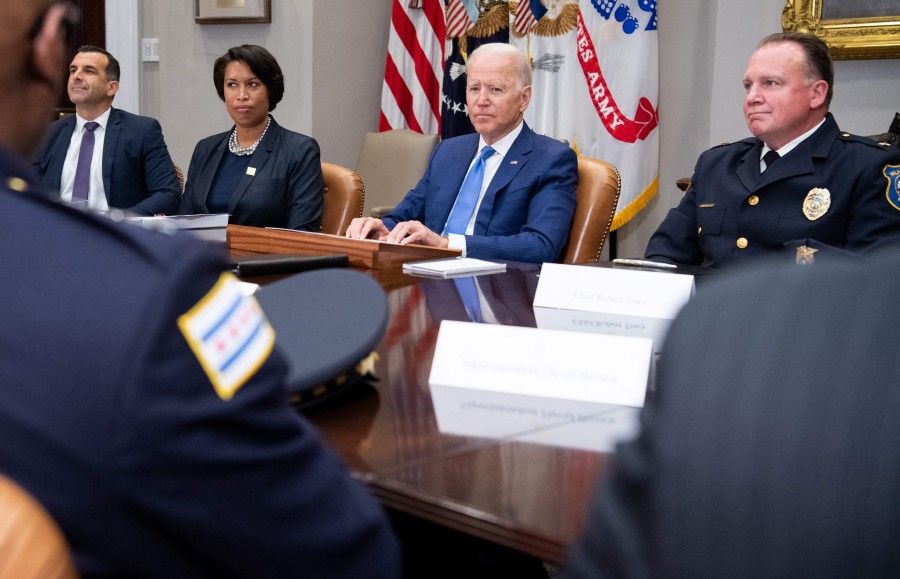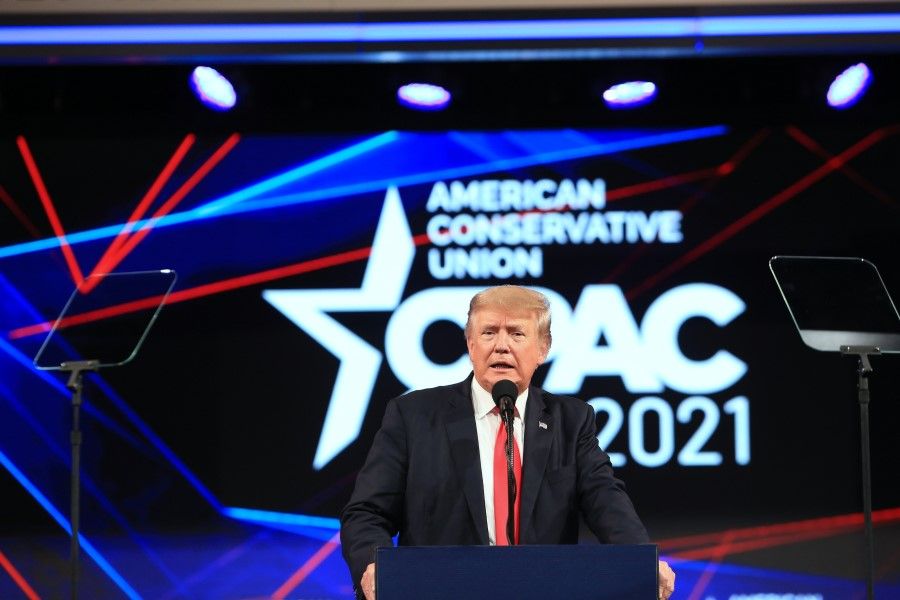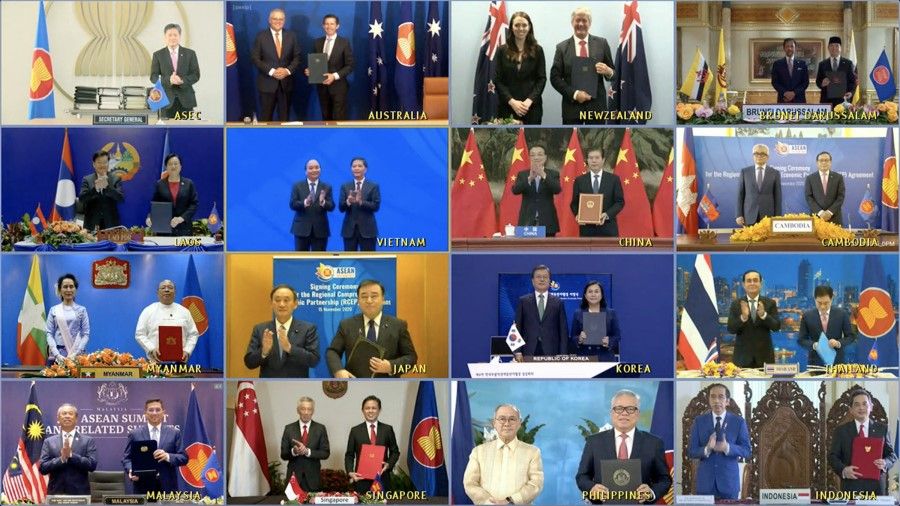SEA nations may need to pick a side as US-China rivalry intensifies

Joe Biden assumed the presidency at a crucial time for the US. The country is deeply divided along racial, economic, and political lines. Furthermore, this growing domestic polarisation presents profound challenges to the Biden administration's foreign policy.
Although the US has been a major security actor in the Asia-Pacific for decades, it is not clear whether Washington will continue to be a reliable partner going forward for two distinct but interconnected reasons: (1) Biden may be distracted from foreign policy by domestic problems; and (2) political polarisation in the US may cause its foreign policy to vary significantly in the future, depending on the political party in control. These two factors are further confounded by Washington's competitive and confrontational approach towards China.
Southeast Asian countries want the US to remain engaged in the region as a major security and economic actor, and seek an equilibrium between American and Chinese presence. However, they are also adamantly opposed to choosing sides between the two superpowers. Yet, as this paper argues, these countries make their decisions based on several factors, including the US's ability to compete with China, US long-term commitment to the region, and their assessment of their own national interests.
Confronting the 'China challenge'
The Biden administration has made clear that its major foreign policy priority is to meet the 'China challenge'. Many Americans believe that Donald Trump was correct to initiate a trade and technological war with China, and the Biden administration has thus far maintained Trump's policy to respond robustly to China's technological development and "decouple" the two countries' economies in strategic sectors, including 5G network and semiconductors.
There is a bipartisan consensus, and across different sectors of American society, that the US must compete with, confront and constrain China. US Secretary of State Antony Blinken has said that US policy towards China will be "competitive when it should be, collaborative when it can be and adversarial when it must be". So far, the Biden administration has focused more on the adversarial and competitive elements although it recognises the need for China's cooperation in matters pertaining to climate change.
Domestically, the Biden administration is using the "China challenge" - "the one last bastion of bipartisan policy" - to justify its plans for governmental expansion and spending, including in areas of science and research and to continue massive military expenditures. Externally, the administration's decision to withdraw all remaining US troops from Afghanistan reflects its desire to remove other strategic distractions so that it can focus on competition with China.

Democrats and Republicans both appear committed to maintaining American power and privilege in the global system. However, unlike Trump, the Biden administration is actively engaging with its allies and partners to confront China. In its early foreign policy acts, the Biden administration sought to reassure American allies that "America is back" and to reverse the damage done to American diplomacy by the Trump presidency. The Democrats recognise the advantages of US soft power and are inclined to pursue multilateral approaches.
Washington has encouraged NATO to reorient its focus towards the Pacific and NATO has declared that China presents "systemic challenges to the rules-based international order and to areas relevant to alliance security". The Biden administration is also seeking to create a coalition of "like-minded states" to balance China, including through the Group of Seven (G7), the Quadrilateral Security Dialogue (Quad) with India, Japan and Australia, and the Five Eyes. However, whether the US can achieve its objectives remains to be seen, given the uncertainty among American allies, along with their own complex relationships with China.
Recently, the US and China resumed trade talks and indicated that areas of common interest and economic exchanges remain potential areas of compromise and cooperation. But this progress can easily be overturned by tensions in the political and security domains. The Biden administration still maintains Trump's tariffs and other economic measures against China, but even if the administration started out dealing with China in a restrained manner, the dynamics of the highly polarised US domestic politics may make it difficult to maintain this restraint.
Domestic constraints on Biden's foreign policy
Biden has made it clear that domestic policy drives US foreign policy. If the US is to "win" the 21st century against other states, it must first be strong at home. The new administration is seeking to pass massive spending bills designed to revitalise the country's infrastructure, alleviate the economic suffering of its citizens, and implement a long-overdue expansion of the US welfare state. If successful, these measures may alleviate many of the forces fueling Trumpism. However, Biden's arduous task is to get his reforms through the Congress amid deeply entrenched bipartisan politics.
Donald Trump's influence over the Republican Party has further hammered in ideological and racial wedges in American society, and undermined democratic norms in the US body politic. The Trump administration's mishandling of the Covid-19 pandemic laid bare the deep divisions within American society, and the Republican Party's institutional failures. Even now, large segments of the population continue to resist public health measures. These failures raise profound questions about the ability of American society and its political system to function collectively. While these domestic challenges may not directly impact executive competence or the soundness of US foreign policy, they do serve as a distraction for American leaders and raise serious concerns for American allies who depend on the US government to act with competence.
...a Trump-like Republican President who disparages alliances and multilateralism may be only one election away.

The immediate challenge for the Biden administration is to re-establish US credibility as a reliable global leader and guarantor of international security. However, a Trump-like Republican president who disparages alliances and multilateralism may be only one election away. A symbiotic right-wing media complex dominates the thinking of millions of Americans, while a substantial majority of Republican voters do not believe that Joe Biden won the 2020 election. These considerations create profound tensions within the US that can absorb President Biden's time, attention and energy and push foreign policy to the side.
The world has experienced how US foreign policy can radically shift as administrations change. George W. Bush rejected the Kyoto Accord. Trump abandoned the Paris Accord, the Joint Comprehensive Plan of Action (JCPOA) with Iran, and the Trans-Pacific Partnership (TPP). Biden may make promises about US leadership on climate change or security policy today, but what the next Republican president will do is not predictable.
The Cold War which kept US foreign policy consistent across political parties is gone, and US foreign policy will continue to shift between Republican and Democrat values for the foreseeable future where the challenge of China is the only area of agreement. But for Southeast Asia, this is not an entirely desirable development.
Furthermore, although a majority of Americans still support US military engagement in alliances and as a deterrent, there is far less support for US involvement in many of the apparently never-ending wars the US embarked upon in recent decades, such as Iraq and Afghanistan. US public support appears contingent on the level of commitment and the likely outcome of the war in question, putting it on an unstable foundation.
US security commitments have little credibility if the American public is reluctant in backing them up, and public distrust of Washington's crusading and interventionist foreign policy is higher than ever. Ultimately, why should Americans risk possible nuclear confrontation with China over rocks in the South China Sea (SCS)? However, public opinion may change if the public can be sufficiently angered and frightened by a real or imagined enemy. Circumstances may appear, either by accident or by design, that force the issue.
The Biden administration will need to understand that its success with Southeast Asia is dependent on several factors, including the US's ability to compete with China, US long-term commitment to the region, and Southeast Asian governments' assessment of their own national interests.
Southeast Asia caught between the US and China
It is still too early to tell exactly what course of action Biden will pursue with respect to China. However, it seems likely that the two countries are embarking on an increasingly rocky relationship. The Biden administration will need to understand that its success with Southeast Asia is dependent on several factors, including the US's ability to compete with China, US long-term commitment to the region, and Southeast Asian governments' assessment of their own national interests.
In the economic domain, the Biden administration has yet to show any intention of returning to the TPP or reversing Trump's economic nationalism, in effect gradually reducing American economic leverage over Southeast Asia. In contrast, China is an economic powerhouse whose growth is fundamentally important to the region's development and whose importance is likely to increase.
Southeast Asian economies are deeply intertwined with China in the global supply chains, and will become even more so upon the entry into force of the Regional Comprehensive Economic Partnership (RCEP) concluded in November last year among ASEAN member countries, China, Japan, South Korea, Australia and New Zealand. The RCEP signifies China's common ground with Southeast Asia in promoting a multilateral open trading system.

Preference in the region for the Trump or Biden administration may not be as clear-cut as one might imagine. On one hand, Southeast Asian countries are committed to multilateralism, especially through ASEAN mechanisms, to address various regional challenges. Trump was, unfortunately, hostile to multilateralism, failing to attend most of the ASEAN summits during his term and withdrawing from the TPP on the first day of his presidency. His incessant attacks on trade and security arrangements with US allies in East Asia will not be fast forgotten.
On the other hand, many Southeast Asian states appreciated Trump's strong positions against Chinese overreach in the SCS and elsewhere. Furthermore, some Southeast Asian governments operate on the spectrum of authoritarianism, and therefore had no qualms about the Trump administration's neglect of human rights and democracy. However, the Biden administration desires to project itself once again as a model of democracy.
Biden has set his sights on winning the ideological competition with China, noting that "this is a battle between the utility of democracies in the 21st century and autocracies". He is working at organising a coalition of "democracies" to arrest the rising trend of authoritarianism which has been enthused and abetted by the success of China's model of state capitalism.
According to Stephen Walt, that battle between the US and China is really over the appeal of different approaches to the international system. The US offers a vision of a liberal democratic order, where only other liberal democracies are fully legitimate. China in turn offers a Westphalian version of the international system where states respect the concept of "sovereignty" and leave each other alone to govern their internal affairs. Both countries adhere to their visions imperfectly and both are open to criticisms of hypocrisy in implementation. The US's record of championing liberal democracy is contingent on its security, ideological and political interests and preferences. China's principle of adherence to national sovereignty rings hollow especially in the SCS context where its belligerence has rattled the Southeast Asian littoral states.
While being optimistic about liberal democracy's long-term appeal, Walt notes that many states may prefer China's vision over that of the US. This is true for Southeast Asian states who indeed promote non-interference as one of ASEAN's basic principles. As such, most Southeast Asian states may not join Biden's coalition of democracies, and his democracy agenda will find it hard to gain traction in Southeast Asia.
If the US rivalry with China becomes as critical to its self-identity as its rivalry with the Soviet Union, then Southeast Asian states will be under enormous pressure to "pick a side."
Southeast Asian states want the US and China to continue functioning as active participants in the Asia-Pacific region. They support the US's military presence and American efforts to counterbalance China and its maritime claims in the SCS. However, they do not want the region to become locked in a conflict that endangers economic growth and provokes political instability at the national or regional level. This has always been a difficult expectation, requiring the US to act in a calibrated way to limit and reject China's excessive claims without taking measures that could lead to outright conflict.
If the US rivalry with China becomes as critical to its self-identity as its rivalry with the Soviet Union, then Southeast Asian states will be under enormous pressure to "pick a side." To date, regional states have been successful in walking the line between the two superpowers. Doing so may be much more difficult in the near future.
This article was first published as ISEAS Perspective 2021/91 "Biden's 'China Challenge' and Domestic Politics: Implications for Southeast Asia" by Shaun Narine.
